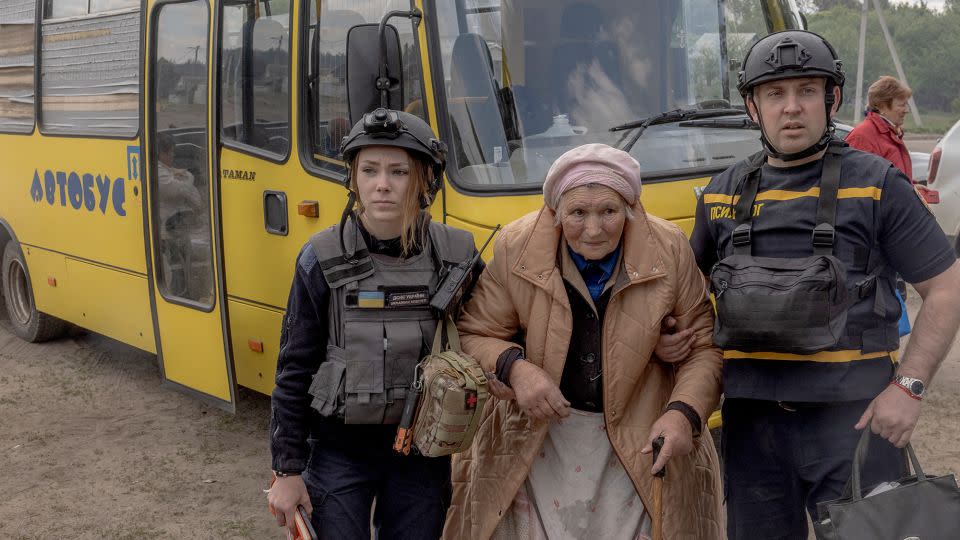The rest of the world wants the Ukraine war to go away. Putin has other ideas
- Oops!Something went wrong.Please try again later.
The changing language used by the Ukrainian military in 72 hours of daily updates tells the story: “Ongoing defensive fighting.” “Significantly worsened.” Russian “tactical success.”
You rarely ever hear Kyiv’s top brass sounding downbeat, but their steep southerly trajectory reflects the grave place Ukraine finds itself in. Russia is not just advancing slowly in one place; it appears to be advancing in four, across the frontline.
Moscow knows it is on the clock: in about a month, the $61billion of US military aid will start to translate into Ukraine having the weapons it has been begging for. So, Russian President Vladimir Putin seems to be throwing whatever he can at it, knowing the fight will likely only get tougher for his forces in the summer ahead.
First, and most acutely troubling, is the northern border near Kharkiv, Ukraine’s second city. Russian forces have crossed the border in multiple locations and claim to have seized nine villages. Their move 3 to 4.5 miles (5 to 7 kilometers) into Ukraine, in the border area above Ukraine’s second city of Kharkiv, is arguably their fastest advance since the first days of the war. Russia has thrown five battalions at the border town of Vovchansk, Ukrainian officials said, which has been hit hard by airstrikes over the weekend.
The town of Lyptsi is at risk, say some military bloggers, and from there Russian forces could hit Kharkiv with artillery. This is a nightmare for Kyiv for two reasons: firstly, they liberated this land from Russian forces 18 months ago, yet failed, clearly, to fortify the area enough to prevent Moscow sweeping back with the ease with which they were swept out.
And secondly, Russia can again tie up Ukraine’s over-stretched army with constant and grinding pressure on Kharkiv, exacting a toll with crude shelling on a vast urban center.
Then there is the rest of the front, where progress in Kharkiv region has been mirrored by old, exhausting fights suddenly seeing new Russian success. This should be the greatest cause for concern to Kyiv, as it suggests a coordinated bid to push in all directions and leave Ukrainian President Volodymyr Zelensky with ugly choices about where to send limited resources, and where ultimately to sacrifice.
Moving slowly south from Kharkiv, closer to Bakhmut, the town of Chasiv Yar has been under intense pressure – a valuable height above two key Ukrainian military towns, Kramatorsk and Sloviansk, which could prove an exhaustive pressure point over the summer on Kyiv’s supply lines. Netailove and Krasnohorivka slightly further south show Russian forces making further gains to the west of Avdiivka, and threatening another key hub – Pokrovsk. If Ukraine begins to fall back further here, its grip on the remnants of Donetsk region could be at risk.
And then overnight, Deep State Map, a Ukrainian military analysis group, said the southern village of Verbove was under greater threat – one of the minimal gains from Kyiv’s stymied summer counteroffensive last year. All across the board, the news is bad: it is a growing calamity.

Ukraine’s rhetorical response has been telling. Its leaders have, for once, openly said how bad it is. They appear to be shuffling commanders around – which is not something you do in the heat of battle without desperate reason. There is vocal criticism of the failure to prepare and fortify the northern border regions over the past year. Indeed, along much of the front line where there is not active fighting, and in the near-rear to active frontlines, fortifications seem wanting, if not entirely absent. It may be that Kyiv believed so much in its counteroffensive last summer, that it failed to entertain the idea of bad news this summer.
Kyiv’s larger problem is global attention. Trenchant statements from European ministers, and even visits from senior Biden administration officials, cannot cut through the fatigue or the notion that helping Ukraine win is something governments see they strategically must do, rather than something their publics actively demand. It is becoming a war the world wishes would go away – side-lined by the horrors of the Middle East – exactly when its outcome is most perilous and vital for European security.
Putin used the weekend to reshuffle some of his cabinet – moving Defense Minister Sergei Shoigu to a more procedural role as National Security Council head, and perhaps further away from the wartime cookie jar. An accountant, Andrey Belousov, will take his place. But this is not necessarily a sign of retribution for failure, or a reset: the same old boys still get nice jobs. It smacks more of Moscow economizing, integrating the war more fully into the economy, and settling in for the longer haul.
The opposite is happening in the West, where the congressional dysfunction pausing that paused the US’s $61 billion in aid has already wreaked havoc on Ukraine’s military effort. Its forces are losing now because of that six-month delay in ammunition reaching them. Europe talks big about making up the gap, but it cannot. And Washington DC will now be in a whirlwind of electioneering ahead of the US elections in November just when Kyiv needs American certainty most.
The news is not just bad, it is worsening daily. The ground on the front lines is drying out, bringing us into the season to attack. Russia has momentum unlike anything seen since March 2022. Ukraine is being forced to admit just how bad the situation is. Much of the world may be tiring of this war, but Putin is not.
For more CNN news and newsletters create an account at CNN.com

